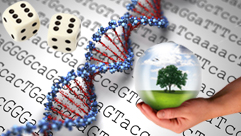Human Disease and Bad Luck: Acting on Genetic & Environmental Factors to Reduce Cancer Risk
Posted on byIn January 2015, a paper in Science created a “buzz” in the scientific community and the media. Based on statistical modelling, the authors suggested that “only a third of the variation in cancer risk among tissues is attributable to environmental factors or inherited predispositions. The majority is due to ‘bad luck,’ that is, random mutations arising during DNA replication in normal, noncancerous stem cells.” They went on to suggest that the importance of this finding is not only for understanding disease but also for designing strategies to limit the mortality it causes. The release of the paper was accompanied immediately by sensational headlines such as
Who gets cancer? Bad luck plays a big role, AJC, Jan 1, 2015
Bad luck, not genes or the environment, cause for many cancers, researchers find, PBS Newshour, Jan 2, 2015
Cancer’s random assault, by Denise Grady, New York Times, Jan 5, 2015
Immediately, scientific and public health communities not only questioned the scientific methods and interpretation of the results of the paper but counteracted the notion of bad luck with the message that we can act to prevent many cancers by acting on what we already know from cancer risk factors.
Cancer is not the result of bad luck, despite what headlines say, by David Hunter, the Boston Globe, Jan 15
Most types of cancer not due to “bad luck”,[PDF 41.96 Kb] Jan 13
Setting the record straight on cancer prevention: lifestyle trumps bad luck, Cancer News in Context, Jan 8
Regardless of the scientific merit and the media misinterpretation of the paper, the individual and population perspectives can be reconciled as they seem to have been lost in the heated back-and-forth debate.
From an individual’s perspective, the perception of “bad luck” may be unavoidable. “Why me?” is a question that people who get cancer or any other disease may well ask themselves. Even for diseases with strong risk factors such as cigarette smoking and lung cancer, most smokers will not develop lung cancer. When smokers develop lung cancer, is it because of bad luck or because they have other known risk factors (such as family history, radon exposure) or because of unknown factors?
From a public health perspective, we know we can reduce a large number of new cancer cases and many cancer deaths can be avoided through lifestyle changes and use of cancer screening. Cancer risk may be reduced by avoiding tobacco, limiting alcohol use, avoiding excessive exposure to ultraviolet rays from the sun and tanning beds, eating a diet rich in fruits and vegetables, maintaining a healthy weight, and being physically active. Screening for cervical and colorectal cancers as recommended helps prevent these diseases by finding precancerous lesions that can be treated before they become cancerous. Screening for cervical, colorectal, and breast cancers also helps find these diseases at an early, often highly treatable stage.
Vaccines also help reduce cancer risk. The human papillomavirus (HPV) vaccine helps prevent most cervical cancers and some vaginal and vulvar cancers, and the hepatitis B vaccine can help reduce liver cancer risk. Making cancer screening, information, and referral services available and accessible to all Americans can reduce cancer incidence and deaths.
Genetics also plays a role in the occurrence of many cancers. For example, people with family history of breast or ovarian cancer are at increased risk and may benefit from genetic counseling and testing, with available interventions to reduce their risks. Similarly, people with family history of colorectal cancer may benefit from earlier and more frequent screening for early detection and interventions. There is also increasing evidence that the interaction between genetic and environmental risk factors can increase risk for a wide variety of cancers.
The bottom line for cancer and for most human diseases, the notion of bad luck for each one of us should be reconciled with the evolving scientific knowledge on genetic and environmental factors associated with disease risk and progression. Such knowledge provides an important foundation for intervention and for reducing the burden of disease for individuals and populations.
Posted on by



